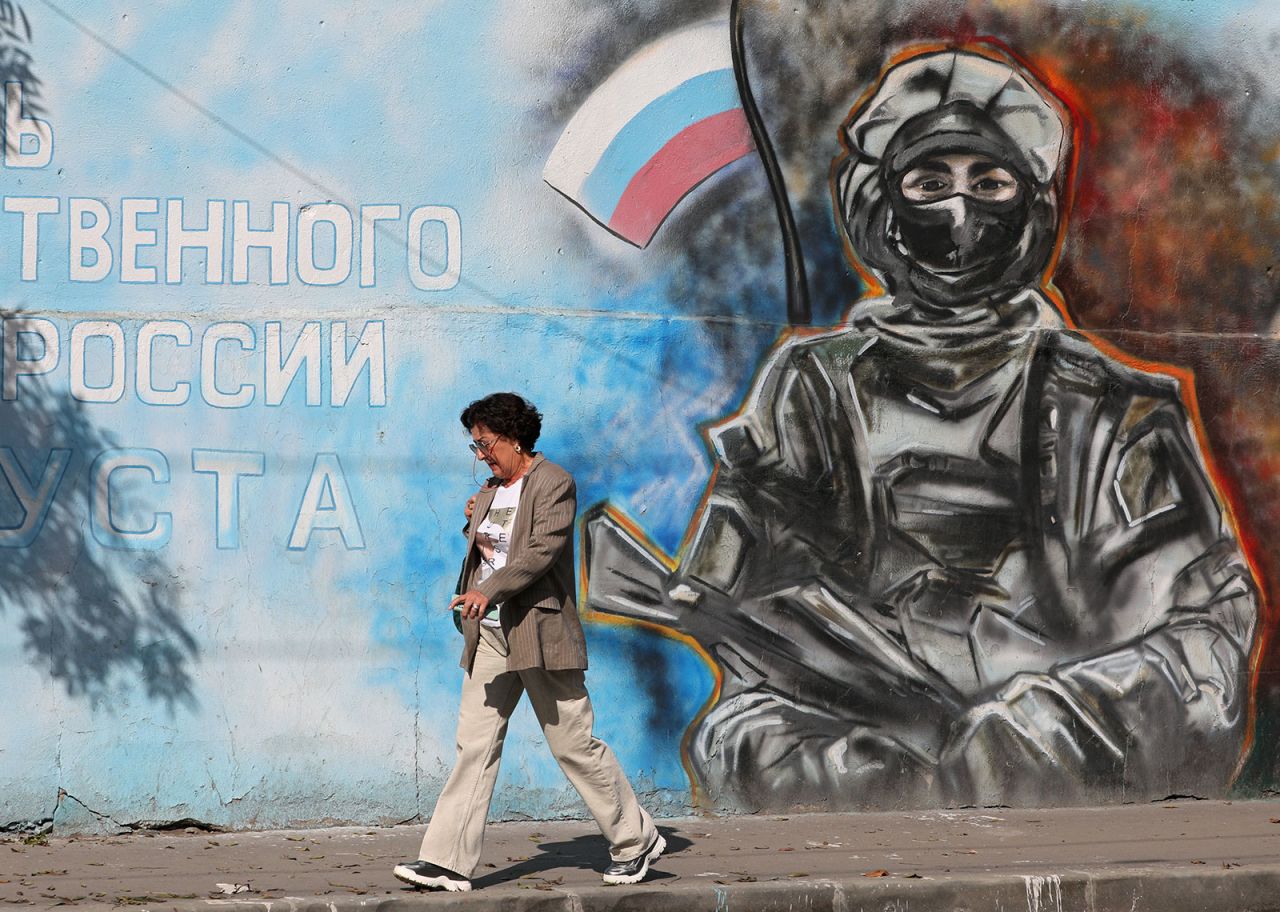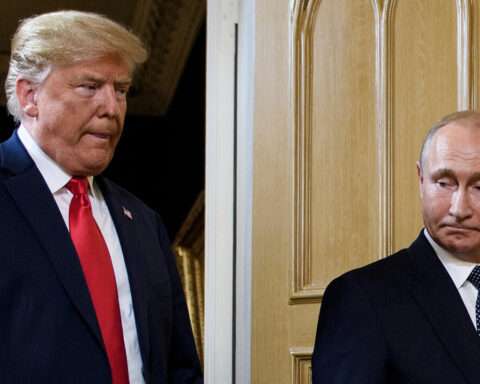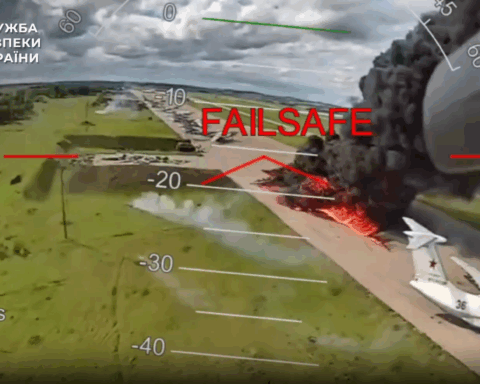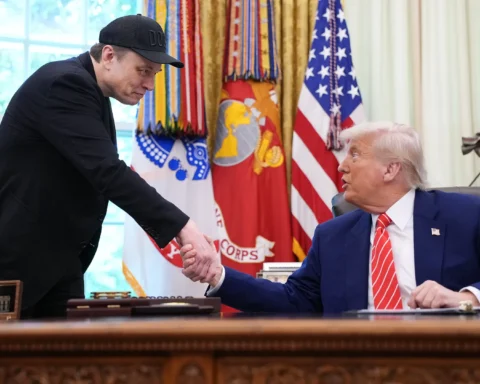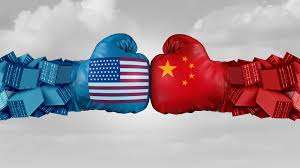In a dramatic shift in U.S. foreign policy, the Trump administration is reportedly prepared to recognize Russian control of Crimea as part of a broader framework to end the ongoing war in Ukraine, according to sources familiar with the matter.
This move, which would align the United States with Moscow’s long-standing position on the annexed peninsula, marks a significant departure from decades of American support for Ukraine’s territorial integrity.
The proposal, still under discussion, has sparked intense debate among allies, with critics warning of far-reaching consequences for European security and the international rules-based order.
On April 19, 2025, the world is watching as President Donald J. Trump navigates one of the most complex geopolitical challenges of his second term. The Russia-Ukraine war, now in its fourth year, has claimed countless lives and destabilized global markets.
Trump, who campaigned on a promise to end the conflict swiftly, appears to be doubling down on a strategy that prioritizes deal-making over traditional U.S. alliances. His administration’s openness to ceding Crimea—a territory Russia illegally annexed in 2014—has raised alarm bells in Kyiv, Brussels, and Washington, even as it offers a potential path to a ceasefire.
A Historic Realignment in U.S. Policy
The Trump administration’s consideration of recognizing Crimea as Russian territory represents a seismic shift in U.S. foreign policy. For decades, American presidents, both Republican and Democratic, have condemned Russia’s actions in Crimea as a violation of international law.
The Obama administration imposed sanctions on Moscow following the 2014 annexation, and the Biden administration rallied international support for Ukraine after Russia’s full-scale invasion in 2022. Trump, however, has long expressed skepticism about U.S. involvement in the conflict, famously stating in 2016 that the people of Crimea “would rather be with Russia.”
Sources indicate that the administration is exploring not only U.S. recognition of Russian control over Crimea but also urging the United Nations to follow suit. This proposal, first reported by Semafor, has not been finalized, and the White House has denied making any firm commitments.
National Security Council spokesman Brian Hughes emphasized that the administration is focused on a “peaceful resolution” and will not negotiate through the media. Still, the mere discussion of such a move has sent shockwaves through diplomatic circles.
Trump’s Plan to Recognize Russian Control of Crimea
The proposal to recognize Russian control of Crimea is part of a broader framework aimed at brokering a ceasefire and, ultimately, a permanent end to the Russia-Ukraine war. Trump has repeatedly touted his ability to resolve the conflict, once claiming he could do so “within 24 hours.”
While that timeline has proven overly optimistic, his administration has engaged in high-level talks with Russian officials, including a phone call between Trump and Russian President Vladimir Putin in March 2025. The call, described by the Kremlin as a step toward “normalizing” U.S.-Russia ties, focused on a potential 30-day ceasefire.
Administration officials, including Secretary of State Marco Rubio and National Security Adviser Mike Waltz, have signaled that territorial concessions by Ukraine may be necessary to achieve peace.
Rubio, speaking after talks with Russian Foreign Minister Sergey Lavrov in Saudi Arabia, said that “all sides” must make concessions. Waltz went further, questioning whether it was realistic for Ukraine to reclaim all its territory, including Crimea, through military means.
The administration’s approach has drawn sharp criticism from Ukraine and its European allies. Ukrainian President Volodymyr Zelenskyy, who has steadfastly rejected territorial concessions, was excluded from early U.S.-Russia talks, prompting accusations that Trump is sidelining Kyiv. European leaders, including French President Emmanuel Macron, have warned that legitimizing Russia’s annexation would embolden authoritarian regimes worldwide.
The Crimea Conundrum: A Flashpoint in the War
Crimea, a strategically vital peninsula in the Black Sea, has been a flashpoint in the Russia-Ukraine conflict since Russia’s annexation in 2014. The move followed a controversial referendum widely condemned as illegitimate by the international community. Despite Russia’s occupation, the United States, Ukraine, and most nations continue to recognize Crimea as part of Ukraine. However, retaking the peninsula militarily is seen as a near-impossible task for Ukraine, even by Zelenskyy, who has acknowledged that diplomacy may be the only viable path.
Trump’s willingness to consider recognizing Russian control of Crimea is not entirely new. During his first term, he suggested that the peninsula’s Russian-speaking population preferred Moscow’s rule, a claim that aligns with Kremlin propaganda. His administration’s current stance, however, reflects a more pragmatic approach, driven by a desire to end the war and reduce U.S. military and financial commitments to Ukraine.
Critics argue that such a move would undermine the principle that borders cannot be changed through force, a cornerstone of the post-World War II international order. Steven Pifer, a former U.S. ambassador to Ukraine, warned that recognizing Crimea’s annexation would “destroy a trans-Atlantic policy” of non-recognition, potentially encouraging further Russian aggression.
Zelenskyy’s Resistance and Ukraine’s Precarious Position
Zelenskyy has emerged as a central figure in the unfolding drama, fiercely opposing any deal that cedes Ukrainian territory. His “victory plan,” presented to Ukraine’s parliament in October 2024, called for NATO membership and the restoration of all Ukrainian territories, including Crimea. The Trump administration’s exclusion of Ukraine from initial talks with Russia has strained U.S.-Ukraine relations, culminating in a tense Oval Office meeting in February 2025 between Trump, Vice President JD Vance, and Zelenskyy.
The administration’s decision in March 2025 to pause intelligence sharing and freeze weapons deliveries to Ukraine has further weakened Kyiv’s position. U.S. officials have described these measures as leverage to pressure Ukraine into accepting a peace deal, but Ukrainian officials fear they signal a broader abandonment. “Combined with the stopping of military assistance, it pretty much guarantees a Russian victory,” one source told CNN.
Zelenskyy has also faced domestic challenges, with Ukraine under martial law since 2022, suspending elections and fueling Russian claims about his legitimacy. Trump has echoed these criticisms, falsely calling Zelenskyy a “dictator” and blaming Ukraine for starting the war. Such rhetoric has deepened mistrust between Washington and Kyiv, complicating efforts to find a mutually acceptable resolution.
Russia’s Calculations and the Global Implications
For Russia, the prospect of U.S. recognition of its control over Crimea would be a major diplomatic victory. Putin, who has justified the annexation as a reclamation of historically Russian land, has shown little willingness to compromise. Moscow’s demands include not only Crimea but also the recognition of four other Ukrainian regions—Donetsk, Luhansk, Kherson, and Zaporizhzhia—as Russian territory, as well as Ukraine’s permanent exclusion from NATO.
The Kremlin has welcomed Trump’s overtures, with Foreign Minister Sergey Lavrov praising the president as a “pragmatist.” However, Russia’s track record of violating ceasefire agreements, such as the 2015 Minsk accords, raises doubts about its commitment to a lasting peace. Analysts warn that Putin may exploit a truce to regroup and pursue further territorial gains, as he did after annexing Crimea in 2014.
The global implications of Trump’s plan are profound. A U.S. decision to recognize Russian control of Crimea could strain relations with NATO allies, who have invested heavily in supporting Ukraine. It might also embolden other authoritarian regimes to pursue territorial ambitions, from China’s claims in the South China Sea to Iran’s influence in the Middle East. Democrats and anti-Trump Republicans have accused the president of “selling out” Ukraine, while conservative populists argue that ending the war aligns with America’s national interests.
A Deal in the Balance
As Trump prepares for further talks with Putin, the fate of Ukraine hangs in the balance. The administration’s push for a quick resolution has yielded some progress, such as an agreement to halt military actions in the Black Sea. However, Russia’s insistence on lifting sanctions and Ukraine’s refusal to cede territory have stalled negotiations. Trump’s recent threats to impose tariffs on Russian oil if Moscow fails to agree to a ceasefire suggest growing frustration, but it remains unclear whether he can bridge the gap between Kyiv and Moscow.
For now, the war rages on, with no clear end in sight. Ukrainians continue to bear the brunt of the conflict, with tens of thousands of soldiers and civilians dead and millions displaced. The Trump administration’s gamble on recognizing Russian control of Crimea may bring the war closer to a resolution—or it may unleash a new wave of instability in Europe and beyond.
Focus Keywords: Trump administration, Russian control of Crimea, Ukraine war, peace deal, U.S. foreign policy, Zelenskyy, Putin, territorial concessions, ceasefire negotiations, international law


